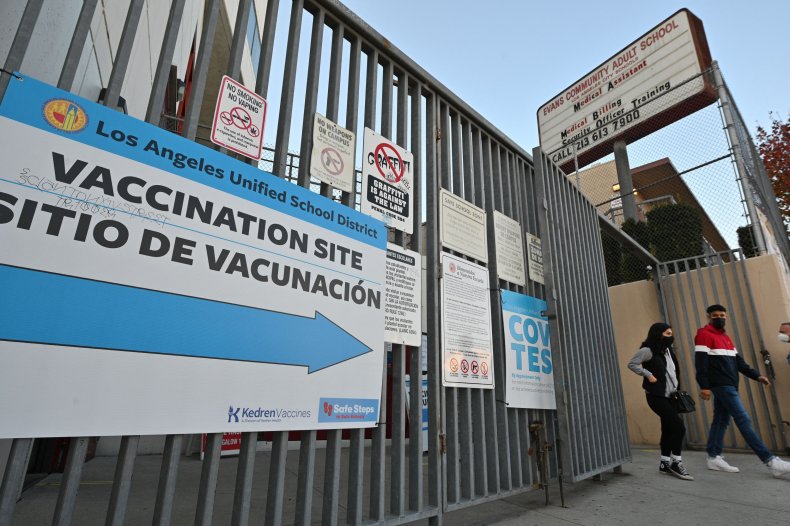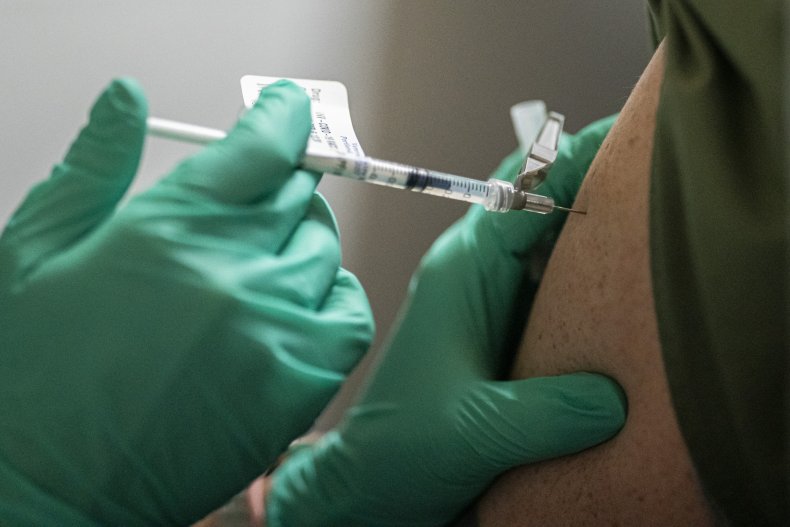U.S. Governors Resist New Mandates, Rely on Personal Responsibility as COVID Drags On
By: Erin Brady (Newsweek)



Across the United States, governors are becoming more hesitant to enact vaccine mandates.
Governors are expressing concern over ordering their citizens to get the COVID-19 vaccine. This hesitancy comes as more states are calling in their National Guard to provide help to overcrowded hospitals. Instead of enacting mandates, they are increasing their efforts to encourage people to take precautions like wearing masks.
"There's no need to panic," said South Carolina Governor Henry McMaster earlier this week. "Be calm. Be happy. We just had a great Christmas season. Business is booming."
While McMaster is a Republican, the same sentiment can be shared among some Democratic governors. One such governor is California's Gavin Newsom, who is discouraging a mandate in favor of personal responsibility.
"I think a lot of people will self-enforce and do the right thing," he told reporters last month.
Overall, the lack of urgency on vaccination mandates is hitting several states across the country. Other states refusing to enforce COVID-19 vaccine mandates include Utah, North Carolina, Oregon and Ohio.
Meanwhile, COVID-19 continues to surge around the country. In its most recent weekly report, the Centers for Disease Control and Prevention (CDC) reported that the current seven-day average for cases reported is 122,297 across all fifty states. Since the beginning of the pandemic, more than 50 million cases have been reported, and around 72.4 percent of the entire U.S. population has received at least one dose of a COVID-19 vaccine. About 61.2 percent of the population, or 203.2 million people, have been fully vaccinated.

California Governor Gavin Newsom is one of many governors around the country hesitant to enact vaccine mandates despite rising COVID cases. Above, people leave a COVID-19 testing and vaccination site at a public school in Los Angeles on January 5.Photo by Robyn Beck/AFP via Getty Images
The sentiment seems familiar to Maryland Governor Larry Hogan. The Republican announced a 30-day state of emergency to fight the Omicron variant surge, but it doesn't include the same statewide mask mandate ordered earlier in the pandemic.
"I'm not sure the people that are refusing to wear a mask are going to wear one anyway, and we don't have the ability to enforce it," Hogan said. "So we're just strongly encouraging people to wear the damn mask."
New Jersey has had the second-largest U.S. caseload during this surge, after New York, and Democratic Governor Phil Murphy asked the state Legislature to renew his emergency powers so he can continue a mask mandate in schools. But renewed business shutdowns and near universal mask mandates appear to be off the table, and instead of issuing new executive orders, he's urging people to follow public health recommendations.
"Here is what we need everyone to really take to heart—the need to mask up, to get boosted and to just practice common sense," Murphy said.
Even governors who pushed the hardest for restrictions during earlier outbreaks have settled on appealing for people to take personal responsibility. Oregon removed its mask requirement from outdoor crowds in November and hasn't reinstated it. Schools and businesses remain open, and Democratic Governor Kate Brown has urged booster shots as the best way to combat the virus.
"Our focus right now is on making sure our most vulnerable Oregonians have access to booster shots and ensuring we are ready to support our hospital systems," the governor's spokesman, Charles Boyle, said in an email.
Read more
- U.S. Unemployment Rate Falls to 3.9 Percent Despite Modest Job Gains
- Trump Says Biden Is 'Voice of Desperation and Despair'
- California Officials Deny Reports COVID Will Move Super Bowl
- After COVID-Positive Staff Work Amid Shortage, Hospital Sees Outbreak
Ohio Governor Mike DeWine, a Republican, was one of the first to close schools in March 2020 as the virus began spreading rapidly through the U.S. But his desire to take aggressive measures has waned, and since the summer he has focused on voluntary mask wearing and vaccinations.
"We don't have the practical ability to really put on a statewide mask order at this point," DeWine said in late December. "I don't think it's appropriate at this point. We have the vaccine. We have the tools."
Montana Governor Greg Gianforte, while listing his accomplishments during his first year in office Tuesday, said that through previous COVID-19 surges there was little differences in case counts between states run by Republicans that tended to take fewer precautions and those run by Democrats, which generally took stronger actions.
"Heavy-handed, one-size-fits-all mandates don't work," Gianforte said.
In North Carolina, Democratic Governor Roy Cooper is still leaving it to local governments to decide whether masks should be required in stores or government buildings rather than ordering them statewide, and encouraging but not requiring local school boards to retain mask mandates for students and staff.
Cooper has taken this tack even though the Republican-controlled Legislature has lacked veto-proof majorities necessary to overturn his previous statewide COVID-19 mandates.
"We're going to have to learn how to live with it, and continue to keep our kids in school and our businesses open and all of our government operations running effectively and efficiently," Cooper said.
Pandemic fatigue among the public has led Utah Governor Spencer Cox to suggest COVID-19 and its variants could be treated more like the flu or any other contagious disease. The focus, he said, should be on reducing the effects of the illness through vaccines and medicines, not government mandates. On Thursday, he encouraged people to wear masks as cases hit record levels and the state was running out of monoclonal antibody treatments, but stopped short of calling for new rules.
"We have lots of illnesses that spread very quickly," he said last month. "But if they're not filling up hospitals and killing people, you know, we go about our business. If they are filling up hospitals and killing people, then obviously it becomes much more concerning."
The Associated Press contributed to this report.

Oregon Governor Kate Brown is forgoing a vaccine mandate for the state in favor of promoting personal choice. Above, a health care worker at the Portland Veterans Affairs Medical Center receives a COVID-19 vaccination on December 16, 2020, in Portland, Oregon.Photo by Nathan Howard/Getty Images

Tags
Who is online
63 visitors


Trolling, taunting, and off-topic comments may be removed at the discretion of group mods. NT members that vote up their own comments or continue to disrupt the conversation risk having all of their comments deleted. please remember to quote the person(s) to whom you are replying to preserve the continuity of this seed. Any Comments or Postings that concern anything but the Article Topic In the opinion of the Seeder are subject to immediate deletion without warning as off topic....
More and more states are now refusing mandates and are relying on personal responsibility... Seems like they are rejecting the big government force solutions...
Even some pretty liberal ones....
Reality has struck. They are beginning to recognize that we need people to work as much as we need people vaccinated.
Not just that, but now that the vaccines are revealed for what they really are, temporary protections like the annual flu vaccines, I think people are also saying what's the point... I mean you go get shot up and you can still catch it... People that were fired last month are being begged to come back to work especially in government...
I think people are just plain tired of the constant hyperbolic fears and are just getting back on with life...
They've pushed it too long....
Amen Brother... I wish more people understood this simple little point...
Here is a curious open 'food for thought': Why do we have a mutating flu virus annually? Does it have to do with chronic 'carriers' across seasons?
(I really don't know.)
The key is personal responsibility trumps mandates.